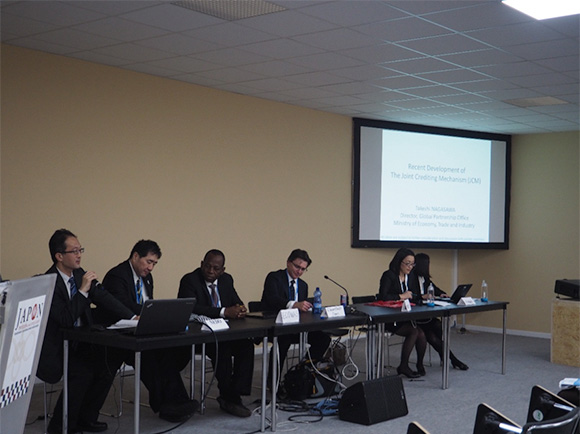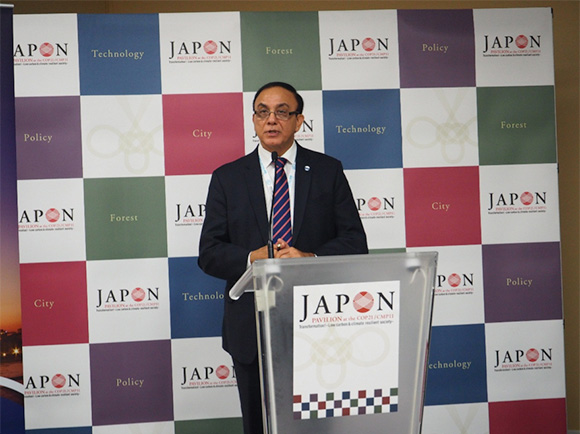How to Innovate Environment Friendly Socio-Systems for Multi-Benefit Climate Actions
New Energy and Industrial Technology Development Organization (NEDO); United Nations Industrial Development Organization (UNIDO)
Outline
In order to secure a safe socio-system for the future against various environmental changes, it is important to consider integrated approaches, recognising and managing its co-benefits and trade-offs. There is a lot of interference between various climate actions which seem to have only trade-offs at a glance, but have potential for co-benefit or more/multi-benefit, if correctly recognised.
In order to maximize such co-benefits in the broader socio-system, the nexus between resources (e.g. energy), economic activities and other socio-environmental issues needs to be considered.
This event will show several key topics on such nexus in climate actions and discuss how to find the technological solutions.
Program
-
- Opening
-
- How can we benefit from climate action for new business opportunity?
- Mr. Mahama Kappiah, Executive Director, ECOWAS, Center of Renewable Energy and Energy Efficiency (ECREEE), SIDS DOCK focal point for African SIDS
-
- What are the challenges and opportunities for promoting eco system innovation?
- Mr. Kevin Braithwaite, Vice President of Global Programs, Chair, Cleantech Open Global Ideas, Cleantech Open
-
- How can Government sector promote environment friendly socio eco system?
- Mr. Takeshi Nagasawa, Director, Global Environment Partnership Office, Ministry of Economy, Trade and Industry (METI), Japan
-
- What role can International Organization play? - Case of LCET (Low Carbon Low Emission Clean Energy Technology Transfer Programme)
- Ms. Hiromi Sugiura, Senior Program Manager and Team Leader, Climate Policy and Networks Unit Energy Branch, UNIDO
-
- What role can International Organization play? - Case of Nexus
- Ms. Yuko Nagata, Industrial Development Officer, Climate Policy and Networks Unit Energy Branch, UNIDO
-
- Good practice of co-benefits/learning and challenge in JCM
- Mr. Masanori Kobayashi, NEDO
-
- Discussion / Q&A
-
- Closing Remarks
- Mr. Shinsuke Unisuga, Director General, Kyoto Mechanisms Promotion Department, NEDO
Mr. Pradeep Monga, Director & Special Representative of the Director General on Energy and Environment, UNIDO
Summary
The session was jointly held by NEDO and UNIDO, titled “How to innovate environment friendly socio-system for multi-benefit climate actions”.
Mr. Mahama Kappiah (ECREEE) introduced sustainable energy strategies to address the issues of energy.
Mr. Kevin Braithwaite (Cleantech Open) shared his experiences on the Global Clean Tech Programme, explaining how it empowered small-middle/venture enterprises to establish an innovative eco-system in developing countries through dissemination of energy and environment technologies.
Mr. Takeshi Nagasawa (METI) explained the outline of the JCM with climate change actions proposed by the Government of Japan as well as the latest policies announced during the conference.
Ms. Hiromi Sugiura and Ms. Yuko Nagata (UNIDO) presented their initiatives under the LCET (Low Carbon Low Emission Clean Energy Technology Transfer Programme), emphasizing the key role the international organization plays in the enhancement of the multi-benefit socio system. They also shared their activities exploring the nexus of water, air, soil and industrial development.
Mr. Masanori Kobayashi (NEDO) moderated a panel discussion inviting all speakers and the floor, and illustrated good practices of co-benefits/learning and challenges in JCM.
Mr.Shinsuke Unisuga (NEDO) made executive summary and Mr. Pradeep Monga (UNIDO) gave his closing remarks.
Key Messages
This session was concluded that;
1) An integrated approach is important in addressing today’s diverse issues (e.g., water, energy, waste, poverty, food).
2) Innovation can be achieved through much more active promotion of capacity building and enhancement of enterprises’ role
3) JCM is one of the most effective tools to facilitate diffusion of innovative low-carbon technologies.
Photograph
Reporters
Ayaka Kubota, New Energy and Industrial Technology Development Organization






